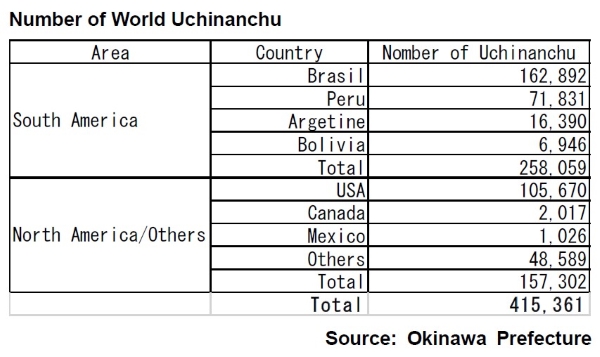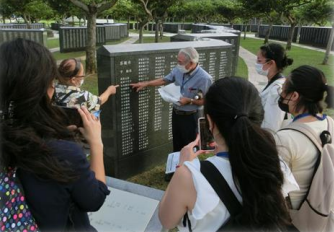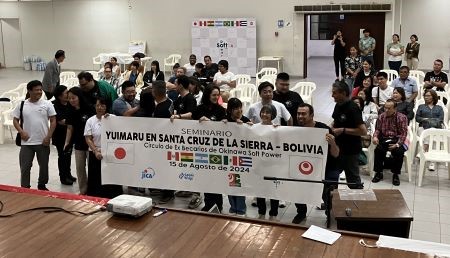Okinawa's Ties with the World

2024.10.08
-

- Kurashina Kazuko Director General Okinawa Center
Did you know that there is a municipality called Okinawa City, created by people who migrated from Okinawa to the Plurinational State of Bolivia, located almost on the opposite side of Japan in South America?
This year marks the 70th anniversary of its settlement. Many Uchinanchu (Okinawans) from all over South America gathered at Colonia Okinawa (Okinawa Settlement) in Okinawa City to renew old friendships, reflect on the journey so far, and celebrate its development.


Overseas migration from Okinawa Prefecture began in 1899 with 27 people who left for Hawaii. Later, Uchinanchu spread around the world, beginning with migration to Peru in 1906, followed by more migration to South America, and then to the South Seas (Pacific islands), and so on. In 1940, the percentage of the prefecture's population living overseas was 10%, the highest in Japan, and considering that Kumamoto Prefecture, the second highest, had less than 5%, the number of Okinawa’s emigrants was extremely high.
There were many reasons for emigration, but one major reason was that the people were poor and had no food to eat. Emigrants sent their hard-earned money to Okinawa, and in 1929, remittances from emigrants accounted for 66.4% of Okinawa Prefecture's revenue. During World War II, emigrants suffered the confiscation of their property in the countries to which they emigrated and were put in concentration camps, but when they learned that Okinawa had been thoroughly destroyed in the war, they sent clothing, food, and other items to help Okinawa recover.
Today there are 420,000 people with Okinawan roots living around the world.

Okinawa Prefecture, which has sent many emigrants to the world, has also stated in its promotion plan that they will "further develop and pass on to future generations a human network based on the global Uchina network※1 ." JICA Okinawa supports Okinawa Prefecture's plan through its Nikkei Community Training Program. The Nikkei Community Training Program aims to contribute to the development of the Nikkei community in each country and to nation-building in their respective countries by inviting those who play a leading role in the cooperation between Nikkei community in Latin American and Japan participate in training in Japan.
One of the Nikkei community training programs in Okinawa is the "Utilizing Soft Power and Community Revitalization through Re-acknowledging Okinawa's Roots" course. This course is expected to strengthen the Okinawan identity and help revitalize the Nikkei community in each region by learning about Okinawa's culture, nature, history, and soft power such as the desire for peace, and by experiencing and interacting with the activities of young people and leaders active in the community in Okinawa. It is also expected to strengthen the network between the Nikkei communities to which the participants belong and Okinawa Prefecture.
This course has been running since 2018, and an alumni association of participants was organized in 2023. JICA have alumni associations of training participants in every country, but course alumni association from different countries is very rare. I was surprised at the "power of Okinawa" to attract people, and felt envious, as a non-Uchinanchu, at the bonds among the participants with Okinawa at the core.

In conjunction with the 70th anniversary of the settlement of Colonia Okinawa, alumni association members organized an event called "Yui-maru" at the Central Japanese Association in Santa Cruz, Bolivia. The event brought together 14 ex-participants from Argentina, Brazil, Peru, Bolivia, and Mexico, who introduced their post-return activities and held a workshop to discuss "The Future of Okinawa's Soft Power" with students from the Japan Bolivian School in Colonia Okinawa.
One of the presenters, Regina Haruyo Miyagi Yamada from Brazil, was one of those who were able to interview her relatives in Okinawa during her training period. As she learned the value of knowing her roots, after returning to Brazil, she has been active in preserving the history and memory of Okinawan immigration to Brazil by researching the roots and photographs of Okinawan immigrants and delivering the results to over 900 people, in cooperation with the Okinawa Prefectural Library, which has data on the immigrants. Her words deeply touched my heart, as she said that knowing one's roots is like a kind of therapy that can lead to inner peace, and that it is very important to know oneself and one's mission.


The August 17 ceremony marking the 70th anniversary of the settlement of Colonia Okinawa attracted as many as 900 Okinawans from Brazil, Peru, Argentina, and other South American countries. Some of the groups traveled dozens of hours by bus to get to the event. I was impressed by the bond and power of Okinawans who maintain their own Okinawan communities in South America and continue to share the Okinawan culture, spirit and values such as "Yui-maru, Ichariba-cho-de ※2 ",and gather together whenever there is a need. It was a day that made me wonder if the bonds between Okinawa Prefecture and Okinawan communities around the world could be this strong, and at the same time, I felt that JICA Okinawa would like to contribute to making these bonds even stronger.

scroll